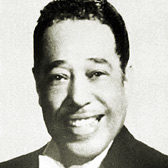
Celebrated dance band conductor on both sides of the Atlantic
Ray Noble
InducteeGained equal success as radio comedian, actor
The songs of the late English bandleader and composer, Ray Noble, are very much of the type for which many take a historical look backwards in saying, "They don't write songs like that -anymore." And without denigrating the wonderful output of songwriters of the nineties, songs like those in Noble's amazing catalog are simply not being written today.
The coterie of classic songs, included the enduring, "The Very Thought Of You," "The Touch Of Your Lips," “Love Is The Sweetest Thing" and "I Hadn't Anyone 'Til You," the latter highly popularized by the famed Tommy Dorsey Band in the late '30s. Many of those remarkable songs were given prominent voice when Ray Noble led in the words of the New York Times' John Wilson, "an extraordinary American jazz band," in the RCA Building's glittering centerpiece, The Rainbow Room.
Born in Brighton, England, in 1903, Noble from an early moment in his life showed distinctive musical tendencies. He studied piano and. arranging as a youth, and at 19, won an arranging competition staged by the English journal of popular music and jazz, The Melody Maker. At 21, he became a staff arranger for the BBC and a year later was named a musical advisor for His Master's Voice (HMV) Records.
For HMV, he became conductor of its house band, known as the New Mayfair Orchestra. The original New Mayfair Orchestra, composed usually of top flight sidemen from other bands in London, was inherited from The Savoy Hotel bandleader, Carroll Gibbons, about whom Noble once wrote, "It consisted very largely of his own lads, who in those affluent days, used to arrive at the studio in riding britches, fresh from a session on horseback in Hyde Park."
Noble wrote his first major hit, the immortal "Goodnight Sweetheart," in 1931, and soon followed it with "By The Fireside," "I Found You" and "What More Can I Ask."
Ray Noble's band recordings were the first by a British ensemble to achieve popularity in the United States, so much so, particularly among college students, that in 1934 he journeyed to America, along with drummer/manager, Bill Harty, and the distinctive South African Vocalist, Al Bowlly. The American bandleader/trombonist, Glenn Miller, helped Noble organize an American orchestra, which at various times in its evolution, included such future bandleaders as Claude Thornhill, Charlie Spivak, Pee Wee Irwin, Will Bradley and soloists Bud Freeman and George Van Epps.
While the band achieved marked success, especially during its engagements in The Rainbow Room, it never reached the level of his British bands and was disbanded in 1937, when Noble went west to Hollywood to begin a brand new and very different career as a radio conductor and comedian. He appeared, as one writer/critic put it, "as a silly ass Englishman in the Fred Astaire movie, A Damsel In Distress." He worked extensively with Astaire and later was a back-up singer on Buddy Clarke's number one American hits "Linda" and "I'll Dance At Your Wedding."
Noble continued producing hit recordings in the late '30s, and records of his compositions, "Cherokee," by the Charlie Barnet Band and "I Hadn't Anyone 'Til You," by the Tommy Dorsey Orchestra were widely recognized as swing era classics. Noble also played musical and comedy roles on the George Bums and Gracie Allen radio shows and with ventriloquist, Edgar Bergen as a stooge for Bergen's famous partner, Charlie McCarthy. For some years thereafter, Noble lived in retirement in Santa Barbara. He died in London in April 1978 at age 71. His songs, however, live on as a living monument to his great composing skills.





